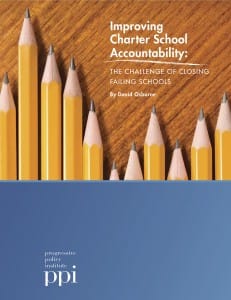 If the mid-2000s—characterized by a shift in charter-school advocacy from quantity to quality—marked the adolescence of the charter movement, today we must shepherd its move into adulthood. The third stage of the charter movement must focus on charter-authorizer quality—the single biggest driver of charter-school quality. This new report from esteemed governance thinker David Osborne explains why this shift in focus is necessary and how we can go about it. Cogent and concise, the report is a valuable resource for those dedicated to improving the performance of the nation’s 5,500-plus charter schools. The hard fact is that most people—and this includes lawmakers, policymakers, and others involved in setting education policy—have no idea what authorizers are, what they do, or why they matter. But if the charter movement is to improve (and competition heightened and taxpayer dollars saved), then authorizers must be supported—and held to account. They are the entities with the authority—as imperfect as it may be—to actually shut down and replace broken charter schools. Osborne’s paper illumines the need for better authorizers, the challenges of getting them, and how states can make progress in this important work. Among his recommendations: Invest in better measures of charter effectiveness, adequately fund authorizers, enforce five-year charter maximums, and truly hold authorizers accountable for schools’ success. May his work on this important topic motivate policymakers and advocates to recognize that the work of improving charter schools begins with improving their authorizers.
If the mid-2000s—characterized by a shift in charter-school advocacy from quantity to quality—marked the adolescence of the charter movement, today we must shepherd its move into adulthood. The third stage of the charter movement must focus on charter-authorizer quality—the single biggest driver of charter-school quality. This new report from esteemed governance thinker David Osborne explains why this shift in focus is necessary and how we can go about it. Cogent and concise, the report is a valuable resource for those dedicated to improving the performance of the nation’s 5,500-plus charter schools. The hard fact is that most people—and this includes lawmakers, policymakers, and others involved in setting education policy—have no idea what authorizers are, what they do, or why they matter. But if the charter movement is to improve (and competition heightened and taxpayer dollars saved), then authorizers must be supported—and held to account. They are the entities with the authority—as imperfect as it may be—to actually shut down and replace broken charter schools. Osborne’s paper illumines the need for better authorizers, the challenges of getting them, and how states can make progress in this important work. Among his recommendations: Invest in better measures of charter effectiveness, adequately fund authorizers, enforce five-year charter maximums, and truly hold authorizers accountable for schools’ success. May his work on this important topic motivate policymakers and advocates to recognize that the work of improving charter schools begins with improving their authorizers.
SOURCE: David Osborne, Improving Charter School Accountability: The Challenge of Closing Failing Schools (Washington, D.C.: Public Policy Institute, June 2012).
